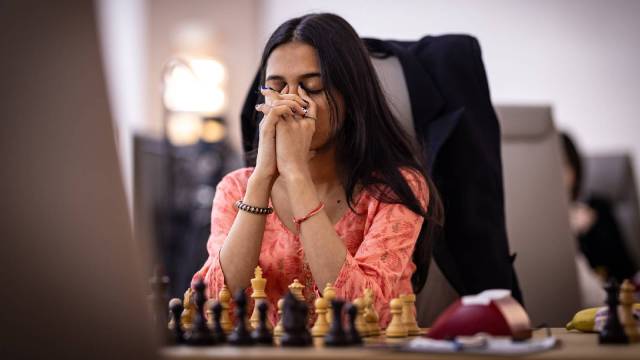Divya Deshmukh reaffirms status as one of country’s best young chess stars as four Indians reach FIDE Women’s World Cup quarterfinals
India holds a 50% representation in the last eight at FIDE Women's World Cup and with Divya and Harika drawn in the same bracket, an all-Indian clash guarantees at least one semifinalist for the first time.
 Divya Deshmukh at the FIDE Women's World Cup. (Credit: Anna Shtourman/FIDE)
Divya Deshmukh at the FIDE Women's World Cup. (Credit: Anna Shtourman/FIDE)Divya Deshmukh remains the only Indian contender yet to achieve the prestigious Grandmaster title among the four left in the fray at FIDE Women’s World Cup 2025. The 19-year-old from Nagpur is also the youngest of the final four Indian players, but the teenager reaffirmed her position as one of the country’s best rising talents after knocking out World No. 4 and tournament second seed China’s Zhu Jiner on Friday to secure her maiden quarterfinal berth.
She is joined by all the Indians who made it through the previous round: Koneru Humpy, Harika Dronavalli, and R. Vaishali, who each won their respective tiebreaks in the fourth round, making it only the first time multiple Indians have advanced to the quarterfinals in the tournament’s history.
Previously, only Harika had reached this stage in 2023. Now, in the event’s third edition, India holds an unprecedented 50% representation in the last eight and with Divya and Harika drawn in the same bracket, an all-Indian clash guarantees at least one semifinalist for the first time.
🇮🇳 Divya Deshmukh (2463) defeats 🇨🇳 Zhu Jiner (2533) in Round 4 of the FIDE Women’s World Cup!#FIDEWorldCup @DivyaDeshmukh05 pic.twitter.com/uDDMiRvDZM
— International Chess Federation (@FIDE_chess) July 18, 2025
Divya seizes chance
Divya came all guns blazing against a tough Chinese opponent. She knew the consequences of a single slip-up. An overambitious Divya had already let Zhu slip from her grip the day before and could not afford to repeat her mistakes. She had stunned the Chinese player in the first leg of their Classical match, upsetting Zhu with white pieces to take a 1-0 lead in the two-legged round.
All Divya had to do was play safe, force a draw in the second leg, and avoid the pressure of tiebreaks. But the very thing she dreaded happened as she lost the following leg with black, pushing the match into a tricky series of tiebreaks played under shorter time controls.
In the tiebreaks, Divya had to start the dark pieces. The odds favoured the Chinese, but Zhu’s decision to exchange queens in an equal position, opting for a tricky, draw-prone rook endgame, backfired badly. When Zhu mistimed her pawn push, Divya seized the chance and converted swiftly to take a 1-0 lead. She remained rock-solid in the second leg of the first tiebreak, refusing to budge and denying Zhu any inroads, winning the round 1.5-0.5.
Interestingly, the loss in the Classical round turned out to be a boon for Divya, who didn’t have time to second-guess her decisions this time. “I wasn’t so much in the mood to prepare after yesterday, so I just figured that whatever happens on the board, I’ll manage and it worked,” Divya told the official broadcasters after the match. “Yesterday, I was thinking all the right moves, but I second-guessed myself. I was my own enemy. I could have easily drawn, but of course, she’s a great player. Still, it was more like I was the one who was lacking. So today, no time to overthink… it’s rapid,” Divya said with a big laugh.
When asked if she had expected the tiebreaks to go so well, she replied, “This is the result I wanted. After yesterday, it was a bit tough because I had a great position out of the opening and just played horribly. But I’m glad I overcame that today.”
Four out of four
Just moments after Divya’s win, Humpy, the most experienced Indian GM, also defeated GM Alexandra Kosteniuk, an equally strong and seasoned Swiss-Russian. Like Divya, Humpy won the first leg of the rapid tiebreak and held Kosteniuk to a draw in the second, sealing the match 1.5-0.5.
 India’s Koneru Humpy in action against Russian-Swiss player Alexandra Kosteniuk. (Anna Shtourman/FIDE)
India’s Koneru Humpy in action against Russian-Swiss player Alexandra Kosteniuk. (Anna Shtourman/FIDE)
Harika’s path to the last eight, however, was far trickier. She suffered a loss to Kateryna Lagno in the first leg of the rapid tiebreak, putting her in a must-win situation against the same opponent who had earlier defeated another Indian, Vantika Agrawal, in the previous round’s tiebreaks. But Harika, one of the finest fighters on the circuit, refused to back down. In a completely drawn game, she forced a critical error from Lagno on the 64th move, clinching the win and pushing the match into another tiebreak. In the 10+10 decider, she first held Lagno to a draw with dark pieces before delivering the final blow with white, securing her place in the quarterfinals.
But nothing came close to the roller-coaster tiebreak between Vaishali and Kazakhstan’s IM Meruert Kamalidenova. Had Vaishali failed to advance to the quarterfinals, she would have had only herself to blame. In multiple winning positions throughout the tiebreaks, she let Kamalidenova claw her way back, as the match stretched from 15+10 to 10+10 and finally to 5+3, where Vaishali, learning from her earlier mistakes, finally dispatched the Kazakh to seal her victory and make it the perfect day for India.
































